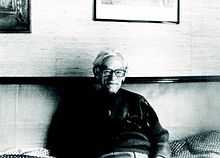Roger Godement
| Roger Godement | |
|---|---|
 | |
| Born |
October 1, 1921 Le Havre |
| Nationality | French |
| Fields | Mathematics |
| Institutions | Paris Diderot University |
| Alma mater | École normale supérieure |
| Doctoral advisor | Henri Cartan |
| Doctoral students |
Reiji Takahashi Hervé Jacquet Gérard Schiffmann Jean-Pierre labesse Paul Gérardin François Rodier Gilles Lachaud |
| Known for |
Bochner–Godement theorem Godement resolution |
Roger Godement (French: [ɡɔdmɑ̃]; born 1. October[1] 1921) is a French mathematician, known for his work in functional analysis, and also his expository books.
He started as a student at the École normale supérieure in 1940, where he became a student of Henri Cartan. He started research into harmonic analysis on locally compact abelian groups, finding a number of major results; this work was in parallel but independent of similar investigations in the USSR and Japan. Work on the abstract theory of spherical functions published in 1952 proved very influential in subsequent work, particularly that of Harish-Chandra. The isolation of the concept of square-integrable representation is attributed to him. The Godement compactness criterion in the theory of arithmetic groups was a conjecture of his. He later worked with Jacquet on the zeta function of a simple algebra.
He was an active member of the Bourbaki group in the early 1950s, and subsequently gave a number of significant Bourbaki seminars. He also took part in the Cartan seminar.
His book Topologie Algébrique et Théorie des Faisceaux from 1958 was, as he said, a very unoriginal idea for the time (that is, to write an exposition of sheaf theory); as a non-specialist, he managed to write an enduring classic. It introduced the technical method of flasque resolutions. It has also been credited as the place in which a comonad can first be discerned.
He also wrote texts on Lie groups, abstract algebra and mathematical analysis.
External links
References
- ↑ see his website http://godement.eu/site/
|